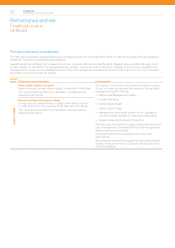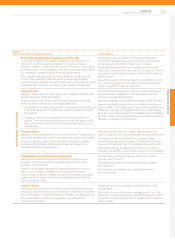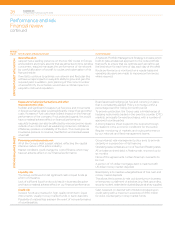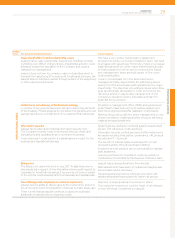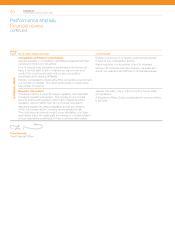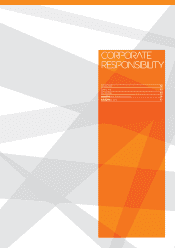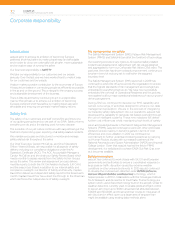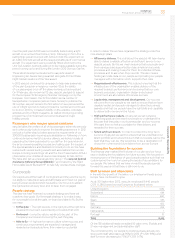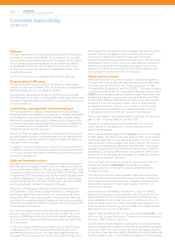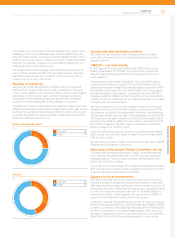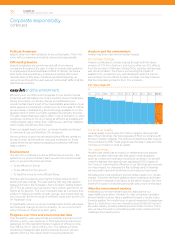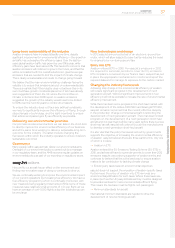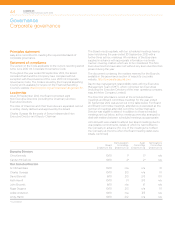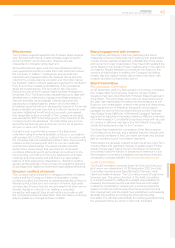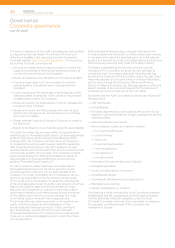EasyJet 2012 Annual Report Download - page 38
Download and view the complete annual report
Please find page 38 of the 2012 EasyJet annual report below. You can navigate through the pages in the report by either clicking on the pages listed below, or by using the keyword search tool below to find specific information within the annual report.
Political donations
easyJet does not make donations to any political party. This in not
inline with our values and would be deemed as inappropriate.
Gifts and gratuities
easyJet employees are sometimes sent gifts from various
companies throughout the year. In order to provide clear guidance
to employees and avoid potential conflicts of interest, we have a
strict policy that prevents any employee accepting gifts over a
nominal value of £35. Every Christmas (and less frequently, at
various times through the year) easyJet holds a staff raffle of all the
gifts that are received.
easyJet and the environment
Efficiency is in our DNA and this applies to our environmental
impact as well. We believe the most important environmental issue
facing the industry is climate change and addressing our
environmental impact is part of our responsibility as an airline. As an
airline easyJet is constrained in what it can do in the area of CSR as
we are heavily constrained by the technology available to us, the
development of which is a highly regulated and lengthy process.
This also means that every year is often “more of the same”, in other
words we continue to focus on being as efficient as possible and
making steady gains, rather than outlining eye catching initiatives
that in reality would have little impact.
Fuel is our largest single cost item, so we are heavily incentivised
tominimise its use and therefore CO2 emissions.
As we continue to grow we are replacing less efficient operators
across Europe, and therefore reducing emissions on those
routeswhere we are replacing capacity provided by inefficient
legacy carriers.
Environment
The aim of our business is to be as efficient as we can be – this
applies to our environmental impact as well. Our environmental
policy is governed by three promises:
A To be efficient in the air
A To be efficient on the ground
A To lead the move to more efficient flying
We have also focused on ensuring the industry plays its role in
tackling climate change. This year was the first year that aviation
played a full role in the European Union’s Emission Trading System
(EU ETS), as carriers are required to have carbon permits for all
flights at EUairports. This is an important step as it ensures that
aviation is helping to tackle climate change, and means that we
can now pushfor the removal of inefficient taxes such as the UK’s
Air Passenger Duty.
To significantly reduce our environmental impact further will require
technological change across the industry, so our environment
policy focuses on these long-term gains.
Progress over time and environmental data
Over the last ten years easyJet has successfully improved our CO2
efficiency every year. However, in 2012 easyJet’s emissions per
passenger km (the standard industry measure of efficiency) rose
from 84.6g / km in 2011 to 85.5g / km. The reflects a further
shortening of stage-lengths and the business focus on primary
airports, which by their nature tend to have long taxi-times.
Aviation and the environment
Aviation has three main environmental impacts:
On climate change
Aviation contributes to climate change through both the direct
emission of CO2 from fuel burn, and due to other non-CO2 effects
from the emission of Nitrogen Oxides (NOx), particles and aerosols
and cloud formation. The science surrounding the impact of
aviation’s CO2 emissions is very well developed, while the science
surrounding non-CO2 effects remains uncertain. It is clear however
that the long-lasting impact is from CO2 emissions.
CO2 / passenger Km
g
110 104.5 98.8 95.7 85.4884.684.487.390.3195.56
2003 201220112010200920082007200620052004
On local air quality
Local air quality impacts arise from NOx emissions during aircraft
take-offs and landings. We have upgraded 57% of our engines with
the tech insertion upgrade. This reduces emissions but also reduces
NOx emissions by 10%. These engines are the best in class and help
minimise our impact on local air quality.
On noise levels
Aircraft noise clearly has an impact on residents around airports.
easyJet complies with local rules that govern noise at airports
(suchas curfews and routings to avoid built up areas). Our aircraft
meet the tightest international noise standards (ICAO chapter 4).
Our focus on improving the efficiency of our flying has also reduced
our noise impact; by changing the flap settings used for landings
wehave both improved fuel efficiency and reduced noise levels.
We believe the most significant environmental impact is on climate
change. This is the dominant global environmental issue, and it also
is of long-term strategic importance to the airline industry. We have
therefore focused our reporting and public policy work on this issue.
Why the environment matters
Addressing our environmental impact is clearly part of our
responsibility as an airline. However, it is also a business imperative.
Environmental concerns have a significant impact on public policy
towards aviation, from restrictions on airport expansion to passenger
taxes. It is therefore in our own interest to ensure that both we and
the wider industry properly address environmental concerns. This is
why we have focused on considering public policy solutions to the
challenges the industry faces.
Corporate responsibility
continued
easyJet plc
Annual report and accounts 2012
36


